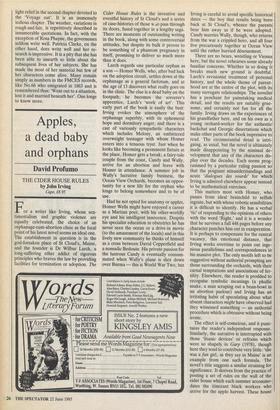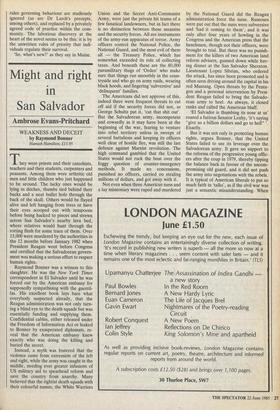Apples, a dead baby and orphans
David Profumo
THE CIDER HOUSE RULES by John Irving
Cape, f8.95
For a writer like Irving, whose sen- timentalism and graphic violence are equally celebrated, the choice of an orphanage-cum-abortion clinic as the focal point of his latest novel seems an ideal one. The establishment in question is in the god-forsaken place of St Cloud's, Maine, and the founder is Dr Wilbur Larch, a long-suffering ether addict of rigorous principles who braves the law by providing facilities for termination or adoption. The Cider House Rules is the inventive and eventful history of St Cloud's and a series
of case-histories of those vi .io pass through its doors, fused together in a lengthy saga. There are moments of outstanding writing in the book, along with some controversial attitudes, but despite its bulk it proves to be something of a phantom pregnancy in itself, promising to deliver so much more than it does.
Larch regards one particular orphan as a son — Homer Wells, who, after bad luck on the adoption circuit, settles down at the orphanage as a general factotum, and at the age of 13 discovers what really goes on in the clinic. The clue is a dead baby on the footpath; he becomes the sorcerer's apprentice, Larch's 'work of art'. This early part of the book is easily the best: Irving evokes the atmosphere of the orphanage superbly, with its ephemeral hope and dormitory anger, and there is a cast of variously sympathetic characters which includes Melony, an embittered overweight teenager with whom Homer enters into a tenuous tryst. Just when he looks like becoming a permanent fixture at the place, Homer gets a break; a fairy-tale couple from the coast, Candy and Wally, arrive for an abortion and leave with Homer in attendance. A summer job in Wally's lucrative family business, the Ocean View Orchards, becomes an oppor- tunity for a new life for the orphan who longs to belong somewhere and to be of use.
Had he not opted for anatomy or apples, Homer Wells might have enjoyed a career as a Martian poet, with his other-worldly eye and his intelligent innocence. Despite his specialist education in obstetrics he has never seen the ocean or a drive-in movie (to the amazement of the locals) and in this lively new community he thinks of himself as a cross between David Copperfield and a nomadic Bedouin. His private passion for the lustrous Candy is eventually consum- mated when Wally's plane is shot down over Burma — this is World War Two, but
Irving is careful to avoid specific historical; dates — the boy that results being borne back at St Cloud's, whence the parents! bear him away as if he were adopted.. Candy marries Wally, though, who returns from the war a crippled hero, and all four live precariously together at Ocean View) until the rather hurried denouement.
There are no bears, wrestling or Vienna! here, but the novel rehearses some already! familiar concerns. Whether in so doing its breaks much new ground is doubtful.! Larch's revisionist treatment of personal history, and the whole theme of parent- hood are at the centre of the plot, with its, many surrogate relationships. The novelist! has a penchant for painstaking medical detail, and the results are suitably grue- some, and certainly not fun for all the family. Irving draws on the experiences of his grandfather here, and on his own as a• young orchard-worker for the authentic backchat and Georgic dissertations which make other parts of the book impressive to! read. The circumstantial detail is intri- guing, as usual, but the novel is ultimately made disappointing by the minimal de- velopment that any of the characters dis- play over the decades. Each seems prog- rammed by a particular ruling passion so that the poignant misunderstandings and acute 'dialogues des sourds' for which Irving is admired elsewhere appear instead to be mathematical exercises.
This matters most with Homer, who passes from ideal brainchild to selfish! ingrate, but with whose robotic sensibilities! it is difficult to identify. He has a verbal! `tic' of responding to the opinions of others with the word 'Right,' and it is a wonder that he survives a full 448 pages before any character punches him out in exasperation. It is perhaps to compensate for the central vacancy, this emotional distance, that Irving works overtime to point out inge- nious parallelisms and correspondences in his massive plot. The only motifs left to be suggestive without authorial prompting are those surrounding the orchards, with their carnal temptations and associations of fer- tility. Elsewhere, the reader is prodded to recognise symbolic meanings (a phallic snake, a man scraping out a bean-bowl in an abortion parlour) and Irving has an irritating habit of speculating about what absent characters might have observed had they witnessed something — an authorial procedure which is obtrusive without being ironic.
The effect is self-conscious, and it punc- tures the reader's independent response. Similarly, the narrative is interrupted with those 'litanic devices' or refrains which were so shapely in Garp (1978), though here they tend to contribute very little: 'she was a fun girl, as they say in Maine' is an
example from one such formula. The novel's title suggests a similar straining for significance. It derives from the practice of
posting a set of rules on the wall of the cider house which each summer accommod dates the itinerant black workers who arrive for the apple harvest. These house
rules governing behaviour are studiously ignored (as are Dr Larch's precepts, among others), and replaced by a privately agreed code of practice within the com- munity. The laborious discovery at the heart of the novel seems to be this: it is by the unwritten rules of priority that indi- viduals regulate their survival.
`So, what's new?' as they say in Maine.















































 Previous page
Previous page